- Home
- Iain Banks
The Bridge Page 11
The Bridge Read online
Page 11
Once, when he was quite small, his dad had taken him to the railway shed where he worked. They overhauled locomotives there, and his dad had taken him round, showing him the huge, tall steam engines being taken apart and put back together, scraped and cleaned and repaired, and he remembered standing watching a massive loco on a static test working up to full speed on a set of buried, whining steel drums, its man-high wheels spinning in a blur, heat quivering from its metal plates, steam whirling about the strobing spokes; linkages and bars and piston rods flashed in the lights of the echoing, ground-shaken shed, and smoke from the engine's chimney pulsed and hammered up a great riveted metal tube which vented it to the shed roof. It was a terrifyingly noisy, blastingly powerful, indescribably vivid experience; he was at once aghast and ecstatic, filled with a sense of appalled, ravished awe at the sheer, stunning, contained power of the machine.
That power, that controlled, working energy, that metal symbol of all that could be done with work and sense and matter resounded in him for years. He would wake up from dreams, panting, sweating, heart pounding, unsure whether he was frightened or excited or both. All he knew was that having seen that pounding, stationary engine, anything was possible. He had never been able to describe the original experience to his own satisfaction, and he had never tried to explain that feeling to Andrea, because he could never fully explain it to himself.
'Here,' she said, passing him the joint and a cigarette lighter, 'see if you can get this to work.' He lit the joint, blew the smoke at her, in a ring. She laughed and waved the fluid grey necklace away from her newly-washed hair.
They smoked the last of his opiated dope. They got the munchies and she made some wonderful scrambled eggs he never forgot and she could never reproduce, they went giggling and sniggering down to the nearest hotel for a quick drink before closing time, then giggling and sniggering back up the road to the house; they started goosing each other, then groping, then kissing, and finally they screwed on the grass at the roadside, invisible (and very cold and quick) in the fog, while twenty feet away people's voices sounded now and again and car headlights crept slowly past.
Back at the house they dried off and warmed up and she rolled another joint and he read a six-month-old paper he'd found in a magazine rack, laughing at the things people found important.
They went to bed, drank the last of the Laphroaig she'd brought, and sat up singing songs like Wichita Lineman and Ode to Billy Joe, with the lines changed - regardless of whether they scanned or not - to make them Scottish ('I am a lineman for the County-Counsell ...', '... and throw them in in the muddy waters off the Forth Road Bridge ...')
He drove the Lotus back, in the fog, at lunchtime on the Monday, slower-than he wanted, faster than she liked. He'd started a poem on the Friday, and he tried to go on with it now, while he drove, but the rest of it just wouldn't come. It was a sort of anti-rhyming, anti-love-song poem, partly a result of him being sick to death of songs rhyming arms and charms and blethering on about love lasting longer than the mountains and the oceans (ocean/emotion/devotion, chance/dance/romance) ...
The lines he had, but could not add to in the fog were:
Lady, that soft skin, your bones and mine
Will all be dust before another mountain's razed.
No oceans, not a river, hardly a stream will dry
Before our eyes do, and our hearts.
Metamorpheus:
One
Some things echo more than others. Sometimes I hear the last sound of all, that never echoes because there is nothing to bounce back from; it is the sound of final nothing, and it comes booming through the great pipes that are the bridge's marrow-less bones like a hurricane, like God farting, like every shout of pain collected and replayed. I hear it then; a noise to rupture ears, split skulls, shatter walls, break souls. Those organ pipes are dark tunnels of iron in the sky, enormous and strong; what other sort of tune could they play?
A tune fit for the end of the world, the end of all life, the end of all things.
The rest?
Just hazy images. Patterns of shadow. Screen not silver; dark. Stop the false and flimsy stuff in the gate if you want to see what it's all made of. There. Watch the pretty colours as it, static, moves again; cooking, burning, bubbling and splitting and peeling back darkly like bruised lips parting, the image forced aside by the pressure of that pure white light (see what I'm doing for you laddie?).
No, I'm not him. I'm just watching him. Just a man I met, somebody I used to know.
I think I met him again, later. That comes later. All in good time.
I'm asleep now, but ... well, I'm asleep now. That's enough
No I don't know where I am.
No I don't know who I am.
Yes of course I know it's all a dream.
Isn't everything?
A wind comes and blows the fog away in the early morning. I dress in a daze, trying to remember my dreams. I am not even sure I did dream last night.
In the sky above the river, swollen grey shapes are slowly revealed by the lifting fog; big bloated balloons like immense pneumatic bombs. Barrage balloons, up and down the length of the bridge.
There must be hundreds of them, floating in the air at about summit height, perhaps higher, and anchored either to the islands, or to trawlers and other boats.
The last of the fog lifts and is scattered. It looks like it will be a fine day. The barrage balloons turn together in the sky, looking not so much like birds but a school of great grey whales, slowly moving their bulbous snouts into the atmosphere's soft current. I press my face to the cold glass of the window, looking down the hazy length of the bridge at as acute an angle as possible; the balloons are everywhere, spread out across the sky, some only a hundred feet or so from the bridge, others standing several miles off.
I assume they are to prevent any more fly-pasts by the aircraft; rather an excessive reaction, I'd have thought.
The letterbox flaps; a letter falls to the carpet. It is a note from Abberlaine Arrol; she will be doing some drawing at a certain marshalling yard a few sections away this morning, and would I like to join her?
Today is looking brighter all the time.
I remember to pick up my letter to Dr Joyce. I wrote it last night after disposing of the returned hat. I have told the good doctor that I wish to delay the hypnosis. I ask his indulgence (politely); I assure him I am still more than happy to meet and discuss my dreams - they have been more profound lately, I tell him, and hence probably more useful in the sort of analysis he originally intended to make.
I put Miss Arrol's letter and my own to the good doctor in my pocket, and stand watching the balloons a moment longer. They swing slowly in the morning light, like huge mooring buoys floating on some invisible surface above us.
Somebody knocks at the door. With any luck, it will be a repairman, for the screen or phone or both. I turn the key and try to open the door, but cannot. The knock comes again.
'Yes?' I call, pulling at the handle. A man shouts from outside.
'Come to have a look at your television set; that Mr Orr, is it?
I struggle with the door; the handle turns but nothing happens.
'Is it? Mr J. Orr?' the man shouts.
'Yes, yes it is. Hold on a moment, I can't get the damn door open.'
'Right you are, Mr Orr.'
I tug and haul at the door handle, twisting it, shaking it. It has never even been stiff before now; not a hint of trouble. Perhaps everything in the flat is designed only to operate for about six months. I start to get angry.
'You sure you unlocked it, Mr Orr?'
'Yes,' I say, trying to keep calm.
'Sure it's the right key?'
'Positive!' I shout.
'Just thought I'd ask.' The man sounds amused. 'You got another door, Mr Orr?'
'No. No, I haven't.'
'Tell you what, push the key through the letterbox; I'll try unlocking it from this side.'
He tries this. It does
not work. I walk back to the windows for a moment, breathing deeply and looking out at the massed balloons. Then I hear more muffled talking outside the door.
'Telephone engineer here, Mr Orr,' another voice calls. 'Something wrong with your door?'
'He can't open it,' the first voice says.
'Definitely unlocked, is it?' the phone man says. The door is rattled. I say nothing.
'You got another door we can use, Mr Orr?' he shouts.
'I already asked him that,' the first man says. The door is knocked again.
'What?' I say.
'You got a phone, Mr Orr?' The television repairman says.
'Of course he has,' the phone man says indignantly.
'Can you phone Buildings and Corridors, Mr Orr? They'll know wh-'
'How can he do that?' The phone man's voice is high with incredulity. 'I'm here to repair his bloody phone, aren't I?'
I retreat to my study before he suggests I watch some television to pass the time.
It takes another hour. A corridor janitor takes the whole wood surround away from the door. Finally the door just clicks open without warning, leaving him standing, puzzled and suspicious, in the midst of broken wood and dusty plaster. Both the repairmen have left for other jobs. I step out, over wooden slats pierced by bent nails.
'Thank you,' I tell the janitor. He is scratching his head with a claw hammer.
I post the letter to Dr Joyce, then buy some fruit to break my fast. My release has left me just enough time to rendezvous with Miss Arrol.
The tram I take is full of people discussing the barrage balloons; most people have no idea what they are for. Once the tram clears the section proper and enters the relatively uncluttered linking span we all turn to look at them. I am amazed.
They are on one side only. Down-river, more barrage balloons than you could shake a stick at. Up-river; not one. Everybody else on the tram points and goggles at the massed balloons; only I, it seems, stare thunderstuck in the other direction, into the unmarred skies up-river beyond the X-ing girders of the linking span.
Not a single solitary balloon.
'Good morning.'
'It is rather, isn't it? Good morning to you too. How's your head?'
'My head is fine. How is your nose?'
'Same horrible shape, but not bleeding. Oh, your handkerchief.' Abberlaine Arrol digs into a jacket pocket, brings out my handkerchief, fresh and crisp.
Miss Arrol has just arrived here on a railway workers' tram.
We are in a marshalling yard, the widest place on the bridge I've seen so far; some of the sidings extend out far beyond the main structure on broad cantilevered platforms. Great engines, long trains of multifarious carriages, sturdy shunters and flimsy, complicated track-maintenance vehicles clank and shift over and across the complexity of lines and points and sidings like ponderous pieces in some huge, slow game. Steam drifts in the morning light, smoke billows across the harsh points of the still blazing arc lamps high in the girders; uniformed men dash to and fro, shouting and waving different coloured flags, blowing whistles and talking quickly into trackside telephones.
Abberlaine Arrol - wearing a long grey skirt and short grey jacket, her hair gathered up inside an official-looking cap - is here to draw the chaotic scene. Her free-hand sketches and water-colours of railway subjects already adorn several boardrooms and office foyers; she is considered a promising artist.
She hands my handkerchief to me. There is something curious in her eyes and stance; I glance at my laundered kerchief and stuff it into a spare pocket. Miss Arrol smiles, to herself, not to me. I have the disquieting impression that I have missed something here.
'Thank you,' I say.
'You may carry my easel for me, Mr Orr; I left it over here last week.' We cross several tracks to a small shed near the centre of the broad, rail-tangled platform of the marshalling yard. Around us, linked carriages and decoupled engines shift slowly back and forth; in other places, whole engines sink slowly through the deck on massively pulleyed platforms transporting them to workshops beneath the tracks.
'What do you make of our strange balloons, Mr Orr?' she asks me as we walk.
'I assume they're there to stop aircraft, though why they're only on one side, I don't know.'
'Nobody else seems to either,' Miss Arrol says thoughtfully. 'Probably another administration cock-up.' She signs. 'Even my father hadn't heard anything about them, and he's usually fairly well informed.'
At the small shed she retrieves her easel; I transport the A-shaped structure to her chosen vantage point. She appears decided upon one of the heavy engine hoists as her choice of subject. She adjusts the easel, sets down her small folding stool, opens her satchel to reveal bottles of paints and a selection of pencils, charcoal sticks and crayons. She surveys the scene with a critical eye, and chooses a black length of charcoal.
'No further ill-effects from our little crash the other day, Mr Orr?' She makes a line on the grey-white paper.
'A certain conditioned nervousness at the sound of rapid rickshaw heel-horns, no more.'
'A temporary symptom, I'm sure.' She unleashes a smile of quite stunning charm, before returning to the easel. 'We were talking about travelling, before we were so rudely interrupted, weren't we?'
'Yes I... I had been going to ask you how far you'd travelled.'
Abberlaine Arrol adds a few small circles and arcs to her sketch.
'University, I suppose,' she says, quickly brushing a few intersecting lines across the paper. 'That was about ...' she shrugs, 'a hundred and fifty ... two hundred sections away. Cityward.
'You ... couldn't see land from there, could you?'
'Land, Mr Orr,' she says, glancing at me, 'my, you are ambitious. No, I could see no land, apart from the usual islands.'
'Do you think there is no Kingdom then, no City either?'
'Oh, I imagine they both exist somewhere.' More lines.
'Haven't you ever wanted to see them?'
'Can't say I have, at least not since I stopped wanting to be a train driver.' She shades areas of the sketch. I can see a succession of vaulting Xs, a suggestion of cloud-shrouded heights. She draws quickly. At the nape of her pale, slender neck some escaped black strands of hair curl over the creamy suface like intricate swirls of some unknown writing.
'You know,' she says, 'I knew an engineer once - quite senior - who thought what we really lived on wasn't a bridge at all, but a single huge rock in the centre of an uncrossable desert.'
'Hmm,' I say, uncertain how to take this. 'Perhaps it is something different to all of us. What do you see?'
'Same as you,' she says, turning briefly to me. 'A bloody great bridge. What do you think I'm drawing here?' She turns back.
I smile. 'Oh, a bit less than a fathom, at a guess.'
I hear her laugh. 'And you, Mr Orr?'
'My own conclusions.' This earns me one of her flashing smiles. She goes back to the drawing for a while, then looks distractedly up for a moment.
'You know the thing I miss most about university?' she says.
'What's that?'
'Being able to see the stars properly,' she nods, looking thoughtful. 'Too much light to see the stars properly round here, unless you go out to sea. But the university was stuck in the middle of farming sections, and it was quite dark at night.'
'Farming sections?'
'You know,' Abberlaine Arrol steps back, arms folded, from her work. 'Places where they grow food.'
'Yes, I see.' It had not occurred to me that other sections of the bridge might be given over to farming; it would not be difficult, I suppose. One might require windbreaks, perhaps even mirrors, to farm on different levels, and water rather than soil would be the best growing medium, but it would be possible.
So the bridge may well be totally self-sufficient in food. My idea that its length was limited by the time it would take for a fast goods train to deliver fresh produce each day would appear to be irrelevant. The bridge can be any length it l
ikes.
Abberlaine Arrol lights a thin cigar. One booted foot taps on the metal deck. She turns to me, folding her arms again beneath the bloused and jacketed contours of her breasts; her skirt swings, comes back; a heavy expensive cloth. There is a hint of a light day-perfume over the fragrant cigar smoke. 'Well, Mr Orr?'
I inspect Miss Arrol's finished drawing.
The broad platform of the marshalling yard has been sketched in, then altered; the lines and tracks look like creepers in a jungle, all fallen to the floor. The trains are grotesque, gnarled things, like giant maggots or decaying tree trunks; above, the girders and tubes become branches and boughs, disappearing into smoke rising from the jungle floor; a giant, infernal forest. One engine has become a monster, rearing out of the ground; a snarling, fiery lizard. The small, terrified figure of a man runs from it, his miniature face just visible, twisted into a shriek of terror.
'Imaginative,' I say, after a moment's thought. She laughs lightly.
'You don't like it.'
'My tastes are too literal, perhaps. The quality of drawing is impressive.'
'I know that,' Miss Arrol says. Her voice is sharp, but her face looks a little sad. I wish I liked the sketch better.
But what a signalling capacity Miss Abberlaine Arrol's grey-green eyes possess! They view me now with an expression almost of compassion. I think that I like the young lady very much.
She says, 'I meant it for you.' She reaches into her satchel and takes out a rag, begins to clean her hands.
'Really?' I am genuinely pleased. 'That's very kind of you. Thank you.'
She takes the drawing from the easel and rolls it up. 'You have my permission to do whatever you will with it,' she says wryly. 'Make paper aircraft out of it.'

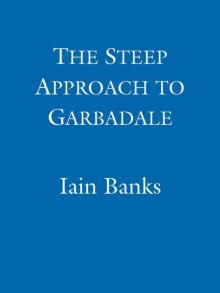 The Steep Approach to Garbadale
The Steep Approach to Garbadale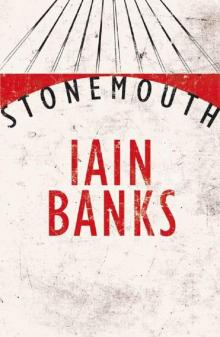 Stonemouth
Stonemouth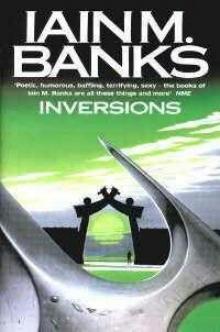 Inversions c-6
Inversions c-6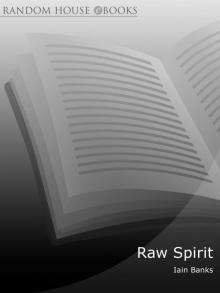 Raw Spirit: In Search of the Perfect Dram
Raw Spirit: In Search of the Perfect Dram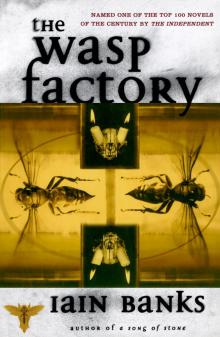 The Wasp Factory
The Wasp Factory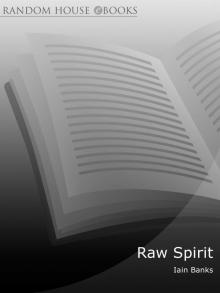 Raw Spirit
Raw Spirit Walking on Glass
Walking on Glass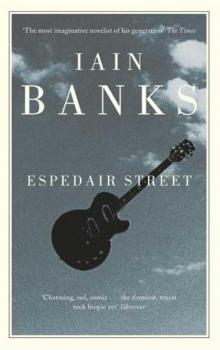 Espedair Street
Espedair Street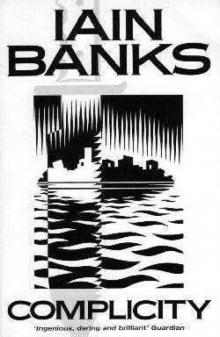 Complicity
Complicity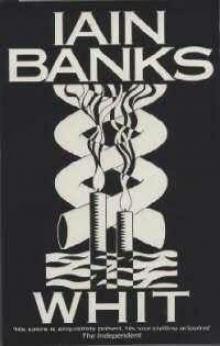 Whit
Whit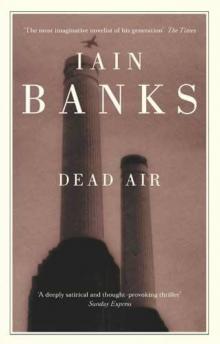 Dead Air
Dead Air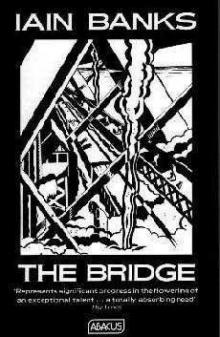 The Bridge
The Bridge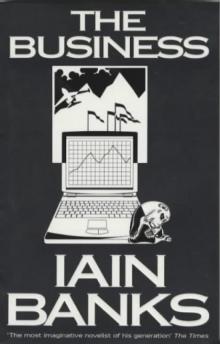 The Business
The Business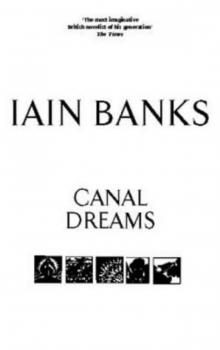 Canal Dreams
Canal Dreams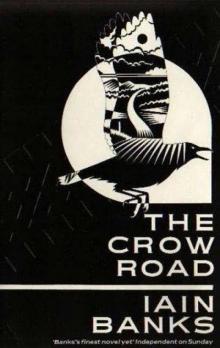 The Crow Road
The Crow Road